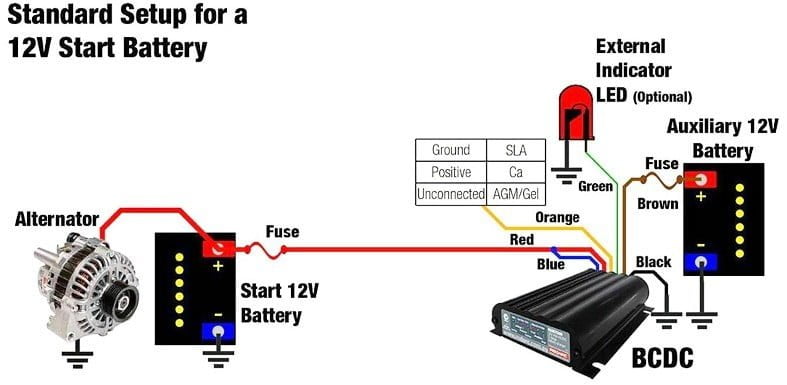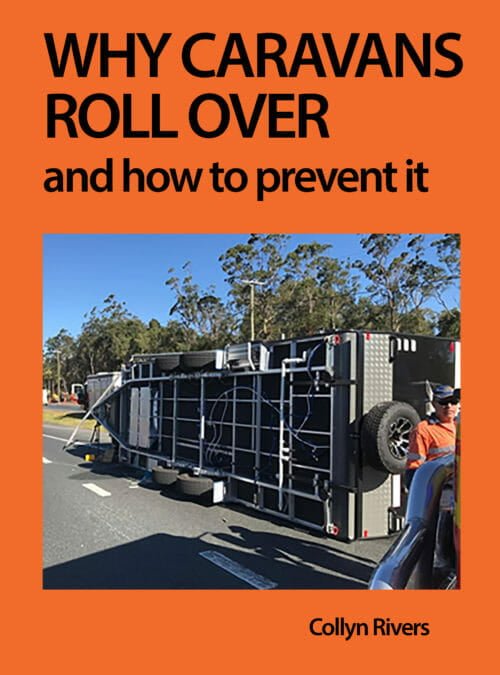by Collyn Rivers
Dc-Dc Charging
Dc-dc charging charges boat, cabins, camper trailer, caravan and motorhome batteries faster and deeper. Collyn Rivers explains how and why.

Pic: original source unknown.
A rechargeable battery is charged by applying a voltage higher than the battery already has. The higher that voltage difference the quicker such a battery charges. As a battery charges its voltage rises. If that charge voltage is constant, however, the difference between that and the charging battery falls.
Alternators charged at a more or less constant 14.2-14.4 volts until 2000. A few still do. Batteries so-charged rarely exceed 80%. As a result, many in caravans never exceed 65%. Moreover, they take hours for even that.
For some years after, many alternators were temperature controlled. They charged at 14.1-14.2 volts when cold. This reduced to about 13.2 volts once warm. Both types can be made to work well for battery charging via dc-dc alternator charging described below.
Variable voltage alternator charging was introduced around 2013. These are controlled by the engine’s central computer unit. They vary the voltage from 15.4 volts to 12.3 volts. Some drop voltage to zero.
How starter batteries are charged
A vehicle’s starter motor is designed to work with 70%-80% charged batteries. The energy required to start cold engines is tiny. It’s less than 2% of battery capacity. This is typically replaced within two minutes. It’s cheap, rugged and simple. Fine generally for starter battery charging – but not for RV use.
Dc-dc charging
Dc-dc alternator charging overcomes these problems. Working fast, deeply, yet safely, it accepts whatever voltage available. Next, it converts it to that optimally required. It bulk charges at whatever current the battery accepts. Such units thus constantly increase charge voltage as battery voltage rises. This enables charging fully, deeply and rapidly.
Such technology, used for telephone exchange batteries for decades, was later adapted for vehicles. See Battery charging and battery chargers.
Dc-dc charging truly scores with batteries distanced from the alternator. Voltage drop prejudices charging, and fridge operation. Heavy cable is necessary. Locating the dc-dc unit close to the battery ensures adequate voltage. It also extends battery life and can transform three-way fridges.
Voltage sensing relays
These systems require a VSR (voltage sensing relay). The VSR senses starter battery voltage. It directs charge to that battery for two to three minutes after starting. It allows auxiliary battery charging once the starter battery exceeds 13.6 volts. The VSR isolates the starter battery if it drops below 12.6 volts. Some dc-dc chargers have VSR functionality inbuilt.
Regenerative braking
Many hybrid vehicles use regenerative braking. Their starter battery is normally 80% charged. Braking increases alternator voltage. This boosts battery charge to 100%. The battery then provides all electrical energy required. During this, alternator output is zero or too low for charging. This causes the VSR to open. That precludes auxiliary charging for minutes each time.
Regenerative braking necessitates dc-dc charging. It is often known as bc-dc. With this, the charger senses the starter battery voltage. I cover these units in Variable voltage alternator problems with caravans/ The article also shows how to know your alternator’s type.
Bc-dc units are made by companies including Redarc and Sterling Products. Some companies now produce all such products as bc-dc. Moreover, those for use with variable voltage alternators are of Low Voltage form (see above Link).
Installation is generally similar to that below. There is, however, no voltage sensing relay. A signal lead is taken from the ignition switch. Makers give full details.
Installing dc-dc charging
Dc-dc charging ensures a battery is alternator-charged safely, deeply and fast. Ensure this locating the charger close to the main energy load and battery. That load is typically a fridge or fridge freezer.
Dc-dc charging optimises charging but you still need adequate cable. Use 10 mm² (ideally 13.5 mm²) from source to charging unit. Makers explain this – but rarely stress its need.
Most such units ensure starter battery charge priority. Recharging generally takes only two to three minutes. If inbuilt protection is not provided (excepting for bc-dc units) a VSR must be used.
Some dc-dc charging units have an inbuilt solar regulator, and/or mains battery charger. The sketch below shows a typical installation.
Installation may vary from brand to brand and type to type. The unit shown will charge an auxiliary battery from a 12-volt alternator. Furthermore, it does so at up to 40 amps.

How to install a typical dc-dc or bcdc charger. The function safeguarding starter battery voltage is inbuilt. Pic: Redarc.
Programming dc-dc charging
Different battery types require different voltage/current settings. Dc-dc chargers have programs accordingly. No programming is needed for alternator voltage. The systems accept whatever that is.
Lithium (LiFePO4) batteries have different needs. Redarc consequently has units specifically for this purpose. It stresses they be used only with LiFePO4 batteries they recommend.

The specialised Redarc LFP series of dc-dc battery chargers for (specific) LiFePO4 batteries. Pic: courtesy of Redarc.
Issues with dc-dc charging
Basic dc-dc alternator charger does not work well (or at all) with variable voltage alternators. Moreover, doing so may damage the auxiliary battery/s. See above re bc-dc charging.
Initial charging of a deeply discharged battery is generally limited to a basic dc-dc charger’s capacity. Dc-dc chargers under 20 amps may take longer to attain half charge. Thereon, charging is hugely faster. The CTEK Smartpass dc-dc charger overcomes this. Moreover, it allows direct alternator charging until dc-dc charging takes over.
This is of less issue with 30-50 amp units. With these, charging limitations are mostly alternator output, and (for some batteries) the maximum they’ll absorb. This is a lesser issue with gel cells and AGMs. It is not an issue with LiFePO4s.

Pic: CTEK ‘Smartpass’ dc-dc charger. Pic: courtesy of CTEK.
Further information:
If you like this article you’ll truly benefit from my books. All are in down to earth English. Moreover, they are technically accurate. Furthermore, batteries and battery charging is covered in depth in Caravan & Motorhome Electrics.
Solar that Really Works! covers cabins and RVs. Solar for larger homes and properties is covered in Solar Success. The Camper Trailer Book and the Caravan & Motorhome Book cover innumerable issues in depth. Click for my Bio.
See also the many articles on this website. Moreover, click here for Article index.
If you like this article, do please add this Link to any related forum query. Moreover, doing so assists others as well as RV Books!




